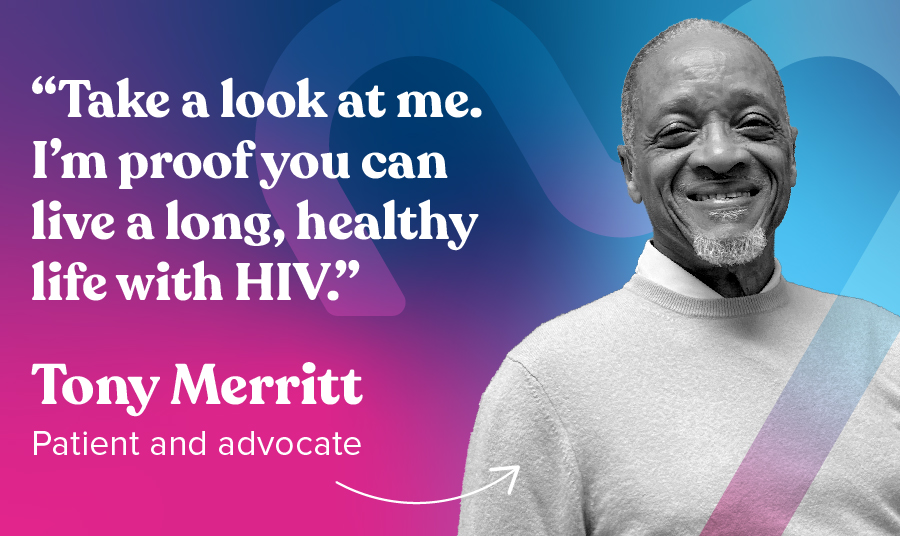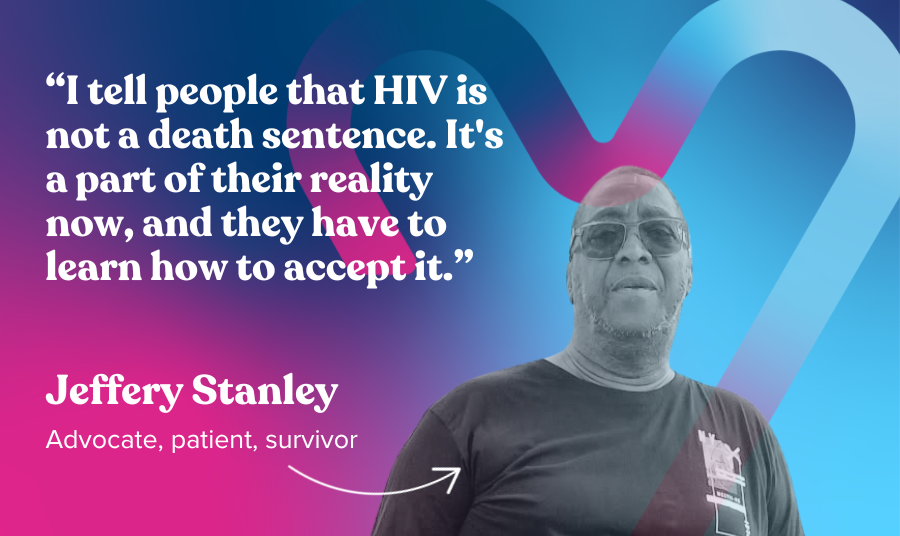More than 2.3 million Americans have been diagnosed as HIV positive since 1981, and each owns a highly personal story of a moment that changed the trajectory of their existence. For 77-year-old AvitaCare Atlanta patient Tony Merritt, his HIV-positive status was a discovery born out of chance that would take him on an almost four-decade journey through fear and loss to pride, advocacy, and a fierce commitment to a life well-lived. Here’s how.
Tony Merritt's HIV-positive status was a discovery born out of chance that would take him on an almost four-decade journey through fear and loss to pride, advocacy, and a fierce commitment to a life well-lived.
Getting the news...twice
It was 1986, and the epidemic was still in its infancy when Tony became aware of his HIV status in a roundabout way: During an examination for colon polyps, his doctor recommended he get tested for the virus. When the results came back positive, Tony, a member of the LGBTQ+ community, was surprised—but says he knew the possibility existed because he was having unprotected sex with men.
Any doubt about the accuracy of his results was soon squashed by a letter he received from the American Red Cross, where Tony regularly donated blood. “It said that my blood came back positive for AIDS, and I was no longer qualified to be a donor,” Tony remembers. “That’s how I know the exact date—I purposefully kept that letter.”
[The letter from the American Red Cross] said my blood came back positive for AIDS, and I was no longer qualified to be a donor. I purposefully kept that letter.
Tony Merritt, patient and advocate
"I was determined to keep living.”
Unlike many individuals at the time, Tony was referred to the care of a compassionate infectious disease doctor. But because his CD4 count, an analysis of a patient’s white blood or “T-cells” that indicates the health of their immune system, was around 500, Tony’s physician advised that they monitor the situation instead of starting azidothymidine (AZT), the first antiretroviral medication used to prevent and treat HIV/AIDS. “There was really nothing else they could do,” Tony says. “He mentioned that a lot of research was going on, and hopefully they would soon find a cure.”
However, while physical symptoms were not yet troubling him, Tony’s mental health was immediately impacted by his positive diagnosis. “I was terrified,” he says. “At that point, if I may be blunt, I did not want to touch another man’s penis. I was even leery about touching mine. That’s what I lived with for years.”
As more of his close friends died of AIDS, Tony didn’t know if he could take another weekend filled with memorial services. “I told a friend of mine, ‘I don’t think I can handle another death,’” Tony says. “It was happening to so many, so often, it was becoming too much for me to deal with.”
As fate would have it, his mother introduced him to Atlanta’s Hillside International Truth Center, where he found solace through his faith and what was then referred to as a “gay-affirming” church community. He remembers attending one sermon during which the minister spoke about the AIDS crisis, encouraging those who had been diagnosed to “live until you die.” Almost four decades later, “I’m sure it had something to do with my ability to survive as long as I have,” says Tony, still a Hillside member. “I’ve governed how I’ve cared for myself by those words all these years. I was determined to keep living.”
Tony remembers attending one sermon during which the minister spoke about the AIDS crisis, encouraging those who had been diagnosed to 'live until you die.' Almost four decades later, he says he's sure it had something to do with his ability to survive.
TONY MERRITT, PATIENT AND ADVOCATE
Treating the whole person
Ten years into living with HIV, Tony’s patient journey took another dramatic turn in a positive direction. In 1996, protease inhibitors, commonly referred to as the HIV “drug cocktail,” became widely available to patients, drastically improving their chances of survival. Tony also began receiving care at what is now AvitaCare Atlanta (formerly AbsoluteCare Atlanta), which partners with MedCura Health to offer compassionate, comprehensive, and inclusive primary and specialized care services to the greater Atlanta community.
During his almost 30 years as a patient there, Tony has appreciated that AvitaCare Atlanta’s providers treat the whole person, not just the HIV diagnosis. In addition to HIV prevention and treatment services, the clinic offers gender-affirming care, sexual wellness care, diabetes management, and behavioral health programs and provides telehealth options, an onsite pharmacy, and a full-service lab.
“I remember one time when I was feeling stressed about a family challenge, and my doctor noticed and asked me what was wrong,” Tony says. “I was able to share something that had nothing to do with HIV and AIDS but was affecting my life and, of course, probably my health.” He reports that knowing he is cared for without judgment about his HIV status or being a member of the LGBTQ+ community makes him more likely to talk openly about his sexual health and stay adherent to his treatment plan.
I remember one time when I was feeling stressed about a family challenge, and my doctor noticed and asked me what was wrong. I was able to share something that had nothing to do with HIV and AIDS but was affecting my life and, of course, probably my health.
TONY MERRITT, PATIENT AND ADVOCATE
Putting a “face on the disease” as an advocate
The mid-90s also found Tony deciding to become an HIV advocate and encouraging others to get tested. “I wanted to put a face on the disease,” he says, “and show people that if you tested positive and adhered to the HIV treatment, you could live a full life.”
As a champion for HIV research, education, and testing, Tony has participated in AIDS Watch Georgia and Washington, D.C., and has attended the U.S. Conference on HIV/AIDS (USCHA). He is also an active member of Thrive SS, a community non-profit organization that provides support for Black same-gender-loving men with HIV in the Metro Atlanta area, joining other men over 50 in Thrive’s “Silver Lining” group.
To those afraid to get tested for HIV, Tony says, “Take a look at me. I’m someone who, like you, was initially fearful. But then I was tested, found out I was positive, went on the medication, and I’ve been adherent to it for over 30 years. I’m proof you can live a long, healthy life.”
He’s also quick to point out that an HIV diagnosis does not mean the end of an active sex life. “If you adhere to the medication, you can have unprotected sex and not be concerned about spreading the virus,” he says, referring to Undetectable=Untransmittable or U=U, a scientifically accepted concept that people with HIV who achieve and maintain an undetectable viral load by adhering to antiretroviral therapy cannot sexually transmit the virus to others. “Ten years ago, I would never have been comfortable talking to people about that. Today, I’m confident in how the treatment works. I’ve lived through a time when nobody wanted to touch you or be in the same room with you. Now I’m comfortable and healthy enough to do all those things and more.”
I wanted to put a face on the disease and show people that if you tested positive and adhered to the HIV treatment, you could live a full life.
TONY MERRITT, PATIENT AND ADVOCATE
A future full of possibilities
What’s next for Tony? What’s not? An avid traveler, he particularly enjoys cruises and plans to sign up for a cruise for same-gender-loving-based individuals in the next year.
One thing’s certain: He doesn’t expect his health to get in the way. “I was just talking to someone,” he recalls, “and I said, ‘The health challenges I’m having are associated with just growing old, but HIV is not one of those things.’ I’m glad to say that part of my life is under control.”
The health challenges I'm having are associated with just growing old, but HIV is not one of those things. I'm glad to say that part of my life is under control.
TONY MERRITT, PATIENT AND ADVOCATE




